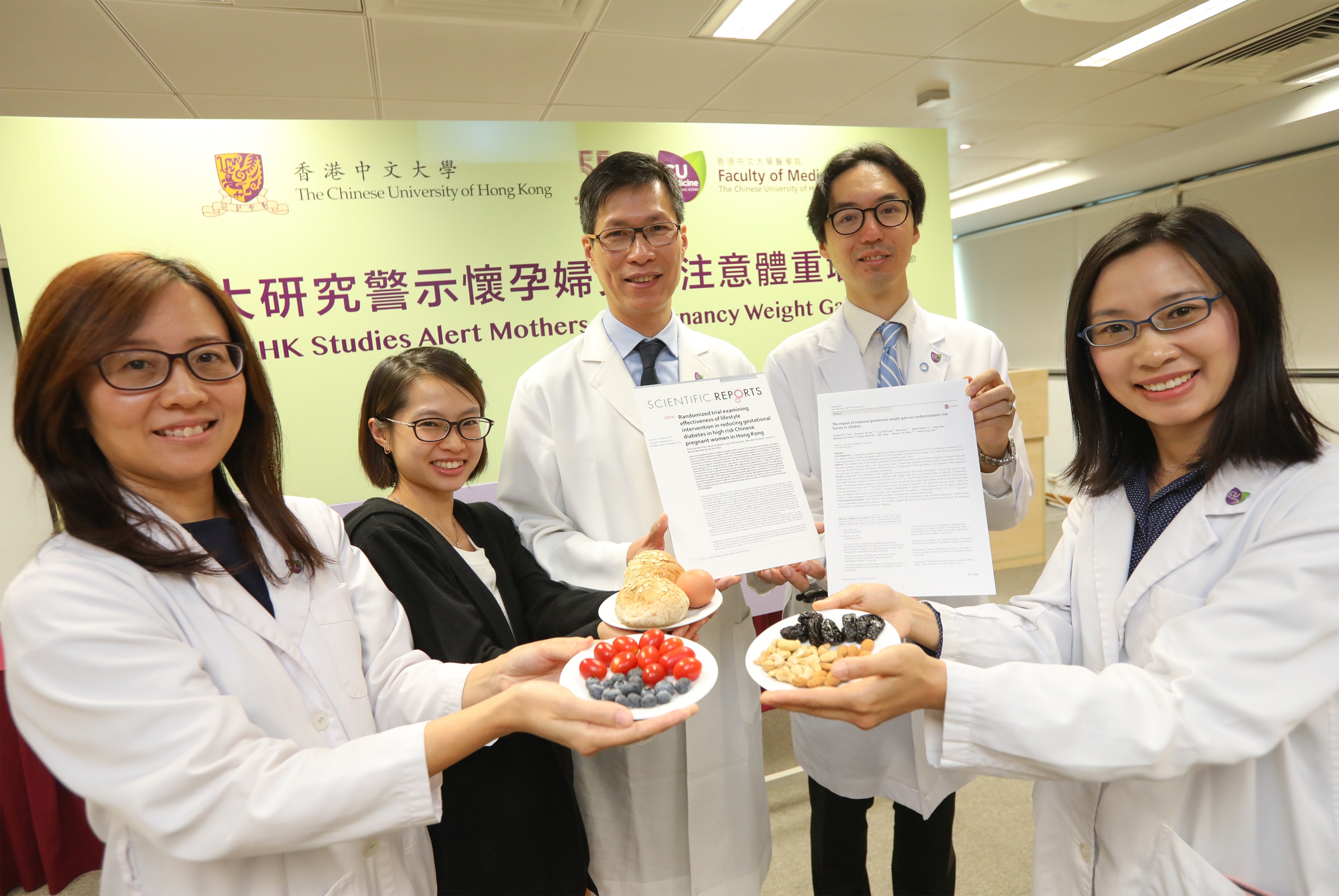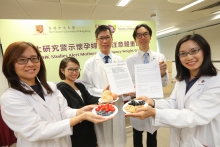CUHK
News Centre
CUHK Studies Alert Mothers to Pregnancy Weight Gain
Recent studies conducted by the Faculty of Medicine at The Chinese University of Hong Kong (CUHK) have warned expectant mothers to watch out for excessive weight gain during pregnancy. Evidence showed that too much or too little weight gain in pregnancy will lead to cardiometabolic risks in offspring. A Lifestyle Modification Programme has been found effective to achieve optimal gestational weight gain.
Recent international study involving CUHK once again confirmed the long-term cardiometabolic risk to offspring from maternal gestational diabetes
A CUHK study[1] published in 2017 suggested that children born to mothers who had gestational diabetes mellitus (GDM) have a 50% increase in the risk of overweight and obesity, against those who were born to mothers with normal glucose tolerance. These women were among Chinese participants in the ‘Hyperglycemia and Adverse Pregnancy Outcome’ (HAPO) study. A recent international multi-centre study, including CUHK, published in the Journal of the American Medical Association (JAMA) echoed this earlier finding – childhood obesity is closely linked with GDM.
Prof. Ronald Ching Wan MA, Head, Division of Endocrinology and Diabetes, Department of Medicine and Therapeutics, Faculty of Medicine, CUHK remarked, “The JAMA study and our earlier study were both based on follow-up research of the HAPO study. Accumulating evidence has shown that gestational diabetes not only brings health concerns to mothers during pregnancy and delivery, but also has adverse effects on the long-term health of their offspring. Hence, we suggest that mothers better monitor their weight gain and maintain a healthy diet and lifestyle during pregnancy, which are crucial in preventing GDM.”
Too much or too little weight gain in pregnancy will affect the baby’s future
There have been studies looking at gestational weight gain (GWG) and its influence on mother and child. In order to provide a standardised reference for doctors and expectant mothers, the Institute of Medicine (IOM) established a set of GWG guidelines according to pre-pregnant Body Mass Index (BMI) in 2009. The academy also called for more research to be done investigating the role of GWG in the long-term health of the offspring.
Using follow-up data from the HAPO study procured at the Hong Kong study centre, researchers from the Department of Obstetrics and Gynaecology, the Department of Medicine and Therapeutics, and the Department of Paediatrics of the Faculty of Medicine at CUHK analysed the data of around 900 mothers, with their children of an average age of 7 years, to explore the influence of GWG. The follow-up assessment was done between 2009 and 2013 with reference to the IOM gestational weight gain guidelines. The study was recently published in the leading international journal Diabetologia.
The results showed that weight gain in pregnancy is closely related to the cardiovascular risks in offspring, even in childhood. And surprisingly, this does not only apply to excessive weight gain but also those whose mothers had inadequate weight gain.
Prof. Wing Hung TAM, Professor, Department of Obstetrics and Gynaecology, Faculty of Medicine, CUHK explained, “We observed a U-shaped relationship between maternal GWG and cardiovascular risks in offspring. Either gaining too much or too little weight will both result in health problems such as high blood pressure and poorer blood sugar control for children. The study also dismissed the idea of ‘eating for two’. The best way to achieve targeted weight gain is to adopt a healthy diet and maintain a daily routine of exercise.”
Lifestyle intervention effective in improving GWG control
The Centre for Nutritional Studies at CUHK and the Department of Obstetrics and Gynaecology conducted a study examining the effectiveness of a Lifestyle Modification Programme in early pregnancy for women at risk of developing GDM.
Between 2015 and 2017, the team recruited a total of 220 pregnant women at risk of GDM, randomising them into an “Antenatal Lifestyle Modification Programme (ANLMP) group” or a “routine care control group”. ANLMP is a modified version of the Lifestyle Modification Programme clinically proven and practised at the Centre of Nutritional Studies of CUHK, to help people stay at a healthy weight as well as improve their knowledge of nutrition, diet, exercise, lifestyle habits and health through an individualised, tailor made lifestyle consultation.
The subjects were recruited at or before 12-week gestation. Among the 110 women allocated to intervention, 80 of them completed the comprehensive programme (till 24-week gestation) which included personalised dietary advice from a dietitian, personalised physical activity advice from an exercise instructor and psycho-social support. The results are as follows:
|
|
ANLMP group |
Routine care control group |
|
GDM rate |
25.0% |
26.7% |
|
Excessive GWG |
18.4% |
25.9% |
Among the 80 participants in the ANLMP group, 14 of them who were highly adherent to the programme demonstrated outstanding outcomes.
|
|
ANLMP group (good adherence) |
|
GDM rate |
7.1% |
|
Excessive GWG |
None |
Dr. Ruth Suk Mei CHAN, Senior Research Fellow, Centre for Nutritional Studies, Faculty of Medicine, CUHK remarked, “The ANLMP is effective in improving excessive GWG and dietary quality among pregnant women with higher adherence to the programme. However, its potential effect on improving other maternal outcomes, in particular GDM risk, may require study with a larger sample size and stronger exercise component to investigate.”
Dr. CHAN added that the Programme can also help expectant mothers who are underweight to achieve targeted weight gain during pregnancy through dietary and lifestyle modifications.
Ms. Bernice Ho Ki CHEUNG, Registered Dietician, Centre for Nutritional Studies, Faculty of Medicine at CUHK provided some dietary tips to antenatal women, “We suggest that pregnant women should have an even spread of food over the day. They can prepare some healthy snacks like fruit and biscuits. For those who have to dine out most of the time, they should avoid consuming calorie drinks such as soup and soft drinks. Try to remove animal skin and fat and avoid minced meat too.”
The research team will continue to do long-term follow-up study to evaluate the effect of maternal hyperglycaemia and GWG on cardiometabolic risk in adulthood.
[1] CUHK Recommends Oral Glucose Tolerance Test for All Pregnant Women Study Reveals Children of Women with Gestational Diabetes Mellitus Have 3-Fold Diabetes Risk: http://www.med.cuhk.edu.hk/eng/home/press_releases/2017/2017_06_01.jsp
Studies conducted by CUHK show that too much or too little weight gain in pregnancy will lead to cardiometabolic risks in offspring. Adopting a Lifestyle Modification Programme can help achieve optimal gestational weight gain. (From left: Dr. Ruth Suk Mei CHAN, Senior Research Fellow, Centre for Nutritional Studies; study participant madam Cheng; Prof. Wing Hung TAM, Professor, Department of Obstetrics and Gynaecology; Prof. Ronald Ching Wan MA, Head, Division of Endocrinology and Diabetes, Department of Medicine and Therapeutics; and Ms. Bernice Ho Ki CHEUNG, Registered Dietician, Centre for Nutritional Studies, Faculty of Medicine at CUHK)
Prof. Ronald MA (right) warns expectant mothers to better monitor their weight gain and maintain a healthy diet and lifestyle during pregnancy, which are crucial in preventing gestational diabetes mellitus.
Prof. Wing Hung TAM says the team will continue to investigate the effects of “gestational weight gain” and “gestational diabetes mellitus” in the different stages of child development.
Registered Dietician Ms. Bernice CHEUNG suggests pregnant women to have even spread of food over the day, and to avoid sugary and calorie dense food or drink.











